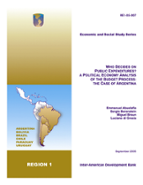Who Decides on Public Expenditures?: A Political Economy Analysis of the Budget Process: The Case of Argentina
Date
Sep 2005
The budget process is increasingly considered key for reform efforts to improve fiscal outcomes. The authors embark on a political economy analysis of the budget process in Argentina, in the spirit of the IDB project "Political Institutions, Policymaking Processes and Policy Outcomes" in order to understand who determines budget outcomes in Argentina. The paper seeks to characterize the institutional framework that regulates the budget preparation, approval, implementation and control. Furthermore, it identifies which actors are involved both formally and informally in the process at each stage, and seeks to understand their incentives and interactions. The findings include the fact that the President has a de facto role that is much more powerful than what the laws and institutions of the budget process stipulate. However, the rigidity of the budget process, together with other constraints such as macroeconomic shocks, fiscal rules, agreements with International Financial Institutions and the influence of other actors such as governors, legislators and lobbies, have limited the ability of the Executive to substantially modify the budget process. The paper includes the analytical framework, and a discussion of some relevant literature on the Argentine budget process; an outline of the political and economic environment in which the budget process has evolved, and an outline of the formal rules of the budget process. Finally, an analysis of the actual workings of the budget process, and how the workings of the budget process are related to fiscal policy outcomes.



